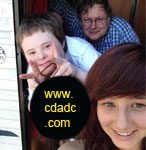

Down Syndrome and Discrimination by the Health and Fitness Industry.
Discrimination is one of the biggest issue that a kid or adult with Down Syndrome will be confronted with. Discrimination against those with Down Syndrome shows in many different ways, but one of the big and eventually life threatening acts of discrimination comes through the health and fitness industry. For example, people with Down Syndrome will be discriminated by the medical profession by being denied treatment, on the basis that people with Down Syndrome are unable to follow post operative procedures. This means that if someone with Down Syndrome requires a heart transplant or some such, then they will be more than likely discriminated against, even if it means they lose their life. This medical discrimination against those with Down Syndrome is very obvious, but the fitness industries discrimination against those with Down Syndrome can be just as devastating and life threatening.
Essentially the discrimination is culturally based – people draw lines and say, at this level of intelligence IQ we devalue life and will not support people with Down Syndrome to lead normal lives.Changing the cultural values of the society is essential for ending much of the discrimination against those with Down Syndrome
Here is some information reported by researchers into Down Syndrome, discrimination and the sports industry:
1. Darrell Rigel, M.D., etal, year 1999.
Athletes in the Special Olympics have skin complaints related to being a competitive athlete. Corns, plantar warts, fungal infections, contact dermatitis, bad acne …
However, athletes with mental retardation and Down Syndrome are more likely to have dry skin, atopic dermatitis, dry lips, ringworm or scabies and skin tumors.
Screening these althletes is therefore desirable, so as to be able to assist them in overcoming these complaints and improving their overall health and fitness as a result.
In other words, athletes with Down Syndrome are not being given the same level of care as other athletes would expect to receive – such discrimination works against them attaining their true level of athletic abilities. As well, the discrimination leads to them suffering from health conditions that other athletes don’t have to suffer as much with. The discrimination is culturally based, with lines drawn which devalue people with Down Syndrome.
Here is information unearthed by researchers into Down Syndrome, discrimination and the health and fitness industry:
2. James Rimmer et al, year 2000. Fitness and disability health tend slip slide after a while. Most people with disabilities [ such as Down Syndrome ] have an essentially sedentary life style. They tend to get too little exercise to promote good health and are, therefore, more prone to getting heart disease, obesity, weight gain, diabetes, kidney failure, high cholestrol, heart attack, and osteoporosis. Yet people with Down Syndrome and other disabilities have lower participation rates in the health and fitness industry, such as gyms, which strongly suggests discrimination is at work.
James Rimmer et al, also found that many of the fitness and recreational facilities are inaccessible to those with mobility problems. Discrimination at it’s worst – the operators of the business can claim they don’t discriminate, it’s just the building they work in, with such arguments in effect causing those with mobility disabilities to be eliminated from their client base – discriminated against. It is good that modern cultures are making it law that businesses must be accessible to those with mobility issues, thereby ending this sort of covert discrimination.
The fitness and recreational facilties are also often staffed by people who are opposed to “>integration of the disabled into their facility – in other words the fitness industry by and large discriminates against those with Down Syndrome. This is in spite of the fact, that those with disabilities, such as those with Down Syndrome, are often obviously in need of these facilities .
OUR INSIGHTS into the fitness industry and how it affects, discrimates against Jacob, a kid with Down Syndrome
Firstly, let me say, that although every act of discrimination is repulsive, that you also need to try and work with the people causing the discrimination and try to understand the complexity of discrimination, else you may start accusing people of discrimination unfairly – something parents can get caught up in.
You see, we have first hand experience of how the fitness industry is not really trained to work with those with disabilities, such as Down Syndrome. I point out before I start, that this does NOT reflect badly on the people trying to work with Jacob, but on the nearly non-existant training provided to them, which could be seen as a covert way of discriminating. The fact is, our Australian society is working hard against the discrimination of people with Down Syndrome and other disabilities, but it is a period of transition and things don’t always run smoothly.
Last year, 2006, when Jacob was learning to swim, he had a SSO worker prepared to get in the water and help him to learn to swim, he also had a swimming instructor who worked closely with the SSO, the result was that Jacob picked up some useful water experience. This year, 2007, this did not happen and the different swimming instructor simply did not know what to do with Jacob – it was a complete waste of time in my opinion, nothing positive came out of it for Jacob, even when I tried I couldn’t seem to make a difference. Another parent of a Gold medal winning swimmer – the swimmer also having Down Syndrome – contacted me and challenged that perception I had. He relayed his son’s story to me. In essence he appeared to be saying that just being there is a learning experience in it’s own right for the kid with Down Syndrome, even if you feel the kid is getting nothing out of it, they still are. They are taking in their environment, seeing interactions of others in the water, experiencing some learning, getting use to things. After some years, his son took an interest in a local swimming team. His dad asked the coach if his son could swim on the sideline with them and he agreed. From there the relationship between the coach and kid grew and the coach, who had no training with the disabled, took the time to go over the steps again and again with the kid. In the end, in ‘normal’ comptetions ( as opposed to those run for the disabled ) he went from running a long distant last, to coming first and being a highly valued member of the swimming team. I stand corrected. In effect, I would have discriminated against my own son, if I hadn’t come to realise the value of the sessions to Jacob.
The lack of workers who know how to teach those with Down Syndrome within the school, and in the afterschool activities as well, can be a big draw back and cause much discrimination against those with Down Syndrome to occur. Last year, Jacob had an experienced worker who integrated him well into the activities, this year the worker had left for another school, and Jacob ended up being withdrawn from the federally funded program by the school principal because there was no one trained to help him. So here we have an Australian federally funded program, by good ol John Howard, Prime Minister of Australia endorsing it, to increase the level of health and fitness of students, but those with disabilities, like Down Syndrome are being discriminated out of the program. After talking with the principal of Jacob’s school, he gave me a phone number to ring and a name to ask for. This lady then put me in contact with another lady who was in the health and fitness industry, who, although having heaps of experience in the fitness and health industry, had NO experience with working with those with disabilities. After talking with the lady, I realised she seemed to be just the one that might help Jacob. On first contact Jacob took to her like magic – wanting to be with her – and although he has only been one Wednesday and Thursday so far, she has been able to achieve very noteworthy results with him. On Wednesday he enjoyed being taught soccer ball skills by the instructor and her and was soon compliant to her instructions, after a little play behavor. On Thursday, he was integrated into the session with the other students and did incredibly well, to the amazment of the other health and fitness instructors there I am told. I am very glad that that dad got back to me about his swimmer son and finding coaches who don’t discriminate.
Likewise, when Jacob has attended basketball training, it was a very negative experience for him, to the point that if I even look like driving into the basketball car park Jacob will start screaming.
In summary, even in Australia, with it’s programs and emphasis on anti-discrimination and including those with disabilities, the lack of proper training of staff effectively means kids with Down Syndrome and other disabilities are being discriminated against in the health and fitness industry.
These examples of discrimination with my son, conveys many of the issues of discrimination that people tend to overlook, when working with people with Down Syndrome.

Leave a Reply
You must be logged in to post a comment.